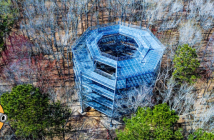It’s that time of the year again. Some of you may be filled with excitement and anticipation, others may be plagued with dread. Nevertheless, it’s time for your professional inspection.
Whether your course is on an annual or more frequent professional inspection cycle, it can be an expensive and time consuming (but valuable) process. A little preparation and foresight can help you get more out of the experience.
BEGIN AT THE BEGINNING
Know what you need before you book your inspection. Check with your course manufacturer, insurance provider, and/or any applicable regulatory agencies to learn the inspection requirements for your site. The ACCT regulations map can help.
Hire the right person for the job. Do they have the necessary certifications and qualifications? Do they have experience with and understand the systems installed at your site? Review the scope of work so both you and the inspector know what will and will not be included in the inspection process and what standards will be applied.
SET CLEAR EXPECTATIONS
Most inspections include a structural assessment of the physical course and an assessment of operational equipment, but don’t assume that is the case. Confirm what items will be inspected, what will be excluded, and how and when you will receive the findings.
Remember, when you are exploring your options for an inspector, price and value are two different things. You’ll be much happier if you are paying for—and get—the services you really need.
Here are a few important items to ask about and understand when engaging with a prospective inspector:
• Scope: What physical components and equipment will be included? Are there specific exclusions?
• Process: What is included in the inspection process? What tests or measurements will be performed to verify the course is in good condition?
• Maintenance: Will any maintenance be performed during the inspection? If so, are there limits or separate fees?
• Repairs: These are typically excluded from inspection services, but small repairs might be an added service option, or the inspector might be able to take the appropriate measurements for future repairs.
• Documentation: Will the inspector review any of the written records for the course? If so, to what extent?
• Operational Review: Most annual inspections exclude an assessment of operations, but if that is something you need or want, consider asking about these services.
• Reporting: What reports will you receive, and when? Will the inspector complete and file state forms on your behalf? Let the inspector know what you need and when you need it.
Finally, find out if the course must be closed during the inspection, who needs to be present, and if any additional conditions must be met for the inspection. For the foreseeable future, this includes informing the inspector of any local travel restrictions due to Covid-19. The inspection process is generally distancing-friendly, but take the time to make a plan with the inspector for how you will both reduce the risk of exposure. >> cont.
PREPARE THE PAPERWORK
While not all inspections include a documentation review, many inspectors will ask to see copies of some key course records to either verify the records exist, or to use them to answer questions he or she has about the course. Such documents may include:
• commissioning documents (may include drawings, geotech, surveys, acceptance inspection, proof testing, etc.)
• engineer letters or drawings, arborist inspections, or other professional reports
• original equipment manufacturer (OEM) manuals
• local operating procedures
• maintenance and repair records
• specialty device servicing records
• accident, incident, and near-miss reports
• operator training records (in-house and professional)
• pre-use inspections and previous professional inspection reports
• equipment inventories and use-logs
Don’t simply organize your paperwork—read it! Take a close look at the maintenance reports, equipment logs, and previous inspections. This will help you anticipate and address issues. Also, make sure all your records are complete and up to date.

Some annual inspections, like those for zips and brakes, need to be scheduled around operations to prevent interruption.
When inspection time comes, set aside any records your inspector has specifically requested. Make sure the person responsible for meeting with the inspector has access to these and any other information that might be needed on inspection day.
PREPARE THE COURSE
Conducting your own detailed periodic inspection well in advance of the inspector’s arrival can help make more efficient use of the inspector’s time on site. You may be able to identify areas of concern to discuss with the inspector or anticipate repair needs. Some professional inspection companies also provide repair and maintenance services. If you communicate these needs ahead of time, you might avoid operational downtime or paying for a separate trip later.
Prior to the inspector arriving on site, verify the course is accessible. Ensure that ladders, keys, equipment, gates, and roads are clear and ready to use.
Check the weather forecast and alert the inspector if there are concerns during the inspection period (snow/ice, heavy rain, storms, etc.). If your inspector is traveling from a distance, he or she may be unaware of the conditions in your area.
PREPARE THE EQUIPMENT
Review your equipment logs and inspection reports to identify any equipment you know is set to expire. Decommission equipment you know will not pass inspection, and make sure you document it and dispose of it appropriately. If there are items you are uncertain about, pull them aside and label them for the inspector to review.
Are there specialty devices, such as auto belays, that require periodic servicing by the manufacturer? If possible, try to coordinate servicing schedules around inspections so the equipment is on site and ready to use, which will allow inspectors to assess both how the equipment is anchored and its compatibility with your course.
Also, time your inspection around operations so the inspector can assess all the equipment together in one place (i.e., equipment is not actively being used by patrons or stored off-site). Inspectors can usually work around some programming, but that requires planning and communication to make sure nothing is missed.
Shortly before the inspector arrives, organize your equipment. Separate lanyards, tethers, harnesses, and hardware from each other, and pre-sort the gear by make, model, and year. Remember all your well-organized records? Ensure the equipment log has the manufacture date, in-service date, and manufacturer’s retirement criteria for each piece of equipment. You’ll end up with a much cleaner, more complete inspection report if all the data is at hand.
Finally, make sure at least one decent set of patron equipment is available for the inspector to use for function testing.
BE PRESENT AND ENGAGED
Before the big day arrives, ask the inspector what he or she needs from you during the inspection, and discuss what you want out of the day as well. If you don’t have other responsibilities that require your attention, you may want to stick around and observe or even help. Most inspectors are amenable to having an experienced manager or operator shadow them during the inspection. You can answer questions about how the course is being used and learn about the inspection process.
When the day arrives, meet the inspector and show him or her around your property. Make sure the inspector knows where all the course components are located and has access to everything he or she needs. If you can’t be present throughout the inspection, make sure the inspector has a way to reach you or another knowledgeable person.
Before the inspector leaves, meet to discuss the initial findings to determine if there are any repair recommendations, provisional passes, or critical failures. Take the time to ask questions and clarify the initial results so you know what you need to open the course safely.
TAKE ACTION
If you receive an initial report summarizing the time-sensitive findings from the inspector, begin by making a plan to resolve those issues. Next, incorporate the detailed findings from the full report into your response plan.
Critical failures must be resolved before the component or item can be used. Immediately notify your operational staff of any failures and implement lockout procedures to ensure failed equipment and components are not used until repaired. Determine how the critical failure affects course operations; sometimes a portion of the course can be isolated or bypassed until the repairs are completed.
Some inspectors will issue a provisional pass or provisional use recommendation if an issue needs to be addressed within a certain period of time, or if the risk can be mitigated through specific limitations of use, such as decreased capacity or a change in operational procedures.
Recommendations for repairs or monitoring typically refer to parts of the course that are currently functioning, but repairs may prevent damage or improve the design. These suggestions are usually intended to increase the function and longevity of the equipment, reduce operational risk, or improve the customer experience.
Make a list and prioritize each action item. Determine what repairs can be addressed in-house and what will require a professional. Develop a budget and a timeline, then schedule the work.
Finally, document everything—write down who did what and when they did it. Add this to your course records and know you just rocked your professional inspection.
Inspection Resources
Here’s a list of ACCT credentialled inspectors. They are qualified to inspect to both the ANSI/ACCT standard and the ASTM F2959 standard. Some states also maintain lists of certified or licensed inspectors.
The state lists are a good place to
find inspectors certified by the National Association of Amusement Ride Safety Officers (NAARSO) and AIMS International, which are sometimes referenced in state regulations. AIMS offers a list of certified inspectors at aimsintl.org.The Professional Ropes Courses Association (PRCA) also certifies inspectors for its ANSI/PRCA standard. Here’s a list.
For more on inspections, see “Challenge Course Pro Tips! What Course Inspections Do I Need?” from The Adventure Guild.






